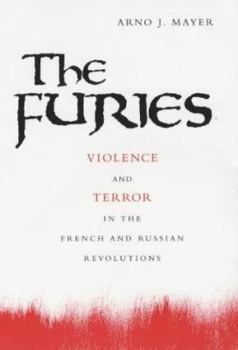The Furies: Violence and Terror in the French and Russian Revolutions
Select Format
Select Condition 
Book Overview
The great romance and fear of bloody revolution--strange blend of idealism and terror--have been superseded by blind faith in the bloodless expansion of human rights and global capitalism. Flying in the face of history, violence is dismissed as rare, immoral, and counterproductive. Arguing against this pervasive wishful thinking, the distinguished historian Arno J. Mayer revisits the two most tumultuous and influential revolutions of modern times:...
Format:Paperback
Language:English
ISBN:0691090157
ISBN13:9780691090153
Release Date:January 2002
Publisher:Princeton University Press
Length:736 Pages
Weight:2.25 lbs.
Dimensions:1.6" x 6.2" x 9.3"
Related Subjects
Europe France History Ireland Modern (16th-21st Centuries) Revolutionary Russia WorldCustomer Reviews
3 ratings
The Furies: Violence and Terror in the French and Russian Revolutions
Published by Thriftbooks.com User , 14 years ago
Excellent volume on comparisons and contrasts between the French Revolution in 1789 and the Russian Revolution in 1917, focusing primarily on the use of terror, fear, and brutality to impose the new ideal over the old (Republic over Old Regime in France, and Bolshevism over the Tsar in Russia).
Evolution, revolution or involution ?
Published by Thriftbooks.com User , 17 years ago
"The revolutions - like Saturn - devour its own sons" The violence and terror in the French and Russian revolutions are separated by a period of almost a century and a third. But the French revolution carved in relief and some how the conscious of the collective in the political decision take, as well as the introduction for the first time in the history of three concepts that sounded much more metaphorically that realistically, liberty, equality and fraternity. The author examines zealously many conceptual signposts such as revolution, vengeance, violence and terror, from a enriched perspective where he makes a lucid revision of the implicit facts derived from these poetic ideas, that not only shocked the world but the way it was molded by this fact. It's useless to affirm the echoes of the French revolution to the light of just two hundred years and two decades, is less than nothing in the history. The inherited paradigms, the wrong beliefs and distorted concepts have generated between other the nationalism fever that altered radically the sociopolitical geography of four continents, besides altered the cultural development all over Europe and seeded new horizons into Philosophy, art and religion; also it accelerated the process of other political movements (The boxers in China, for instance) but even its influence in the happen of both World Wars as well as the significance of liberation in the ancient colonies for better or worst, the emancipation and adhesion of Turkey into the same entrails of the Western hemisphere in the second decade of XX century, among other consequences. But there is so much conceptual material to discuss, state and argue that this little review is simply quite short to intend to expose, that it's better to take a profound reading around this invaluable essay that claimed for being exposed. A text of maxim interest for all kind of readers.
Fascinating study of counter-revolutionary violence
Published by Thriftbooks.com User , 22 years ago
In this book, Mayer studies the French Revolution of 1789 and the Russian Revolution of 1917. He seeks to explain why the peoples made these great revolutionary advances, and also why the nobility fought to destroy them and to restore the savage old orders. He studies the role of religion in the counter-revolutions, particularly the Papacy's bitter hostility to the Revolutions, compared to its notorious slap on the wrist for the Nazi counter-revolution. He cites Michelet's famous remark that the numbers killed by the Spanish Inquisition in just one province of Spain far exceeded the number killed by those defending France and its Revolution. The Inquisition was the crowning revelation of Christianity's ingrained violence, its hostility to people who dared to think for themselves, and to think differently from the Church: for six centuries, the leaders of the Catholic Church ordered the killing of millions of men and women for the glory of God. After the French Revolution, the British ruling class organised the foreign counter-revolutionary war. This enormously increased the economic, social and military difficulties faced by the new Government. Later in the war, Napoleon continued France's defence against the counter-revolution, upheld the Revolution's destruction of the nobility's privileges, and extended its gains abroad. After the end of World War One, the rulers of the British, US and French states united in `helping the Whites overthrow the Bolshevik regime', as Mayer writes. Their intervention prolonged the civil war, enormously increasing the suffering of the Soviet people, and adding to the huge economic, social and military difficulties faced by the new Government. Stalin played a key part in defending the Soviet Union against the Intervention; later, he expanded the Revolution's gains and, after defeating Hitler's counter-revolutionary intervention, extended these gains to the nations of Eastern Europe. However, studies that focus on the violence and terror involved in counter-revolutions, even those studies, like Mayer's, that explain why people defended their countries' Revolutions, tend to overlook those Revolutions' tremendous achievements. Of course, people fought to survive the furies of the counter-revolution, but they also fought to build better societies, and they succeeded.





